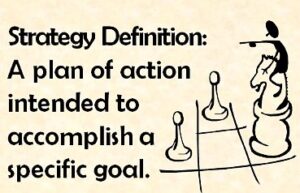
Strategy is a broad concept, embracing an objective, resources, and a plan for using those resources to achieve the objective.
—William P. Snyder
Strategy. is a process that an organization employs to achieve specific goals or objectives. It is a plan of action designed to achieve a long-term or overall aim, often in a challenging environment. It can be defined as a careful plan of action or method. The strategy typically involves analysing the current situation, identifying opportunities and challenges, setting specific goals, defining the resources required, determining the steps to be taken, and monitoring progress along the way. Effective strategies require careful planning, execution, and adaptation based on changing circumstances. Ultimately, a successful strategy should help an organization achieve its objectives and maintain a competitive advantage.
Military Strategy. Military strategy refers to the art and science of planning and directing military operations and campaigns. It involves the development of plans and tactics for the use of military force in achieving specific objectives, whether in a single battle or a larger campaign. Military strategy is based on the analysis of the strengths and weaknesses of both one’s own forces and those of the enemy, as well as the political and social context of the conflict. The military strategy typically involves a number of components, including, objectives, force structure, and deployment, logistics, tactics, intelligence, communications, risk assessment, etc. Effective military strategy requires careful planning and execution, as well as flexibility and adaptation based on changing circumstances. Successful military leaders must be able to think creatively, make quick decisions under pressure, and inspire and motivate their troops to achieve their objectives.
Air Warfare Strategy. Air warfare strategy is the art of planning and directing the overall air operations. Air warfare strategy typically involves a number of key campaigns like offensive counter-air to achieve the desired degree of control of the air, defensive counter-air for protection, Strategic air operations, force application to shape the battlefield, Intelligence, surveillance, and reconnaissance (ISR), and electronic warfare, etc. Effective air warfare strategy requires the integration of these components into a cohesive plan that can be executed efficiently and effectively. Air warfare strategy also requires careful consideration of the risks involved, including the possibility of collateral damage and the potential for escalation of the conflict.
Factors Influencing Air Strategy. There are several factors that dictate air strategy. Effective air strategy requires careful consideration of these factors, as well as the ability to adapt to changing circumstances and to take advantage of new opportunities as they arise. These factors include:
- Military objectives: The overall objectives of the military campaign or operation will determine the specific tasks that airpower needs to be accomplished.
- Available resources: The number and types of aircraft, weapons systems, and other resources available will dictate the scope and nature of the air campaign.
- Enemy capabilities: The capabilities of the enemy’s air defence systems, fighter aircraft, and other weapons will influence the tactics and strategies used to carry out air operations.
- Geographic Factors: The terrain, weather conditions, and other geographic factors can impact the effectiveness of air operations, such as visibility, range, and access to targets.
- Political Considerations: Political factors, such as the potential impact on civilians, international relations, and public opinion, can also influence air strategy.
- Technological Advances: Advances in technology, such as new aircraft, weapons systems, and communications technologies, can provide new opportunities and challenges for air operations.
- Human Factors: The skills, training, and experience of aircrew and ground personnel, as well as their ability to adapt to changing circumstances, can also play a significant role in air strategy.
“Thus those skilled in war subdue the enemy’s army without battle. They conquer by strategy.”
― Sun Tzu
Suggestions and value additions are most welcome
For regular updates, please register here
References and credits
To all the online sites and channels.
Disclaimer:
Information and data included in the blog are for educational & non-commercial purposes only and have been carefully adapted, excerpted, or edited from sources deemed reliable and accurate. All copyrighted material belongs to respective owners and is provided only for purposes of wider dissemination.
